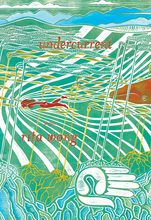undercurrent
By Rita Wong
Nightwood Editions
96 pages; $18.95
Reviewed by Cole Mash
In her poem “The Wonders of Being Several,” Rita Wong quotes Louis Pasteur, writing, “the role of the infinitely small, is infinitely large.” This quotation rings especially true of Wong’s new collection undercurrent. Though it spans only 96 pages, make no mistake—the book is immense.
Wong turns her socially conscious verse to defending the water which shaped her life. Wong writes that the Bow River—which runs through Calgary where she grew up—“taught [her] the power of water from an early age.” Since then, Wong has published three books of poetry including the critically acclaimed forage (2007) which won the 2008 Dorothy Livesay Poetry Prize and Canada Reads Poetry 2011. Wong now teaches at Emily Carr in the unceded Coast Salish lands known as Vancouver.
undercurrent is a lament for the “mostly unseen” strife of the water, and an exploration of its complexity. We do not look out our bedroom window and see the waste in The Kettle River or the great Pacific garbage patch, and their devastating effects, but it does not mean it isn’t there. Though she admits, ironically, that she never learned to swim, the water has taught Wong wisdoms which she graciously extends to us via the page: in “Declaration of Intent,” she writes, “i hereby honour what the flow of water teaches us/the beauty of enough.” Wong has learned what she wants us all to know: that we need to stop taking from something that gives so much; we must take care of the world’s most precious asset, fresh and salt alike.
undercurrent comes out of Wong’s community work in Vancouver, and her collaboration with The Downstream Project, an organization dedicated to preserving natural resources and raising awareness through the arts and technology. Wong’s undercurrent gives that water a voice through poetry, both subtly and forthright, throughout the book. She does so through smaller gestures such as referring to the ocean as simply “ocean” (a proper name with the Marlattian lower case Wong almost exclusively employs) as though it were a person that the beach sleeps beside. Often poems in the book are dedicated to bodies of water such as “Unsung Service,” which is dedicated to the Fraser River, also known as Sto:lo in the Indigenous language Halkomelem. Many of her poems, including the first poem in the book “Pacific Flow,” take on the shape of water, and often have two currents of stanzas running down the page. The poem “Fresh Ancient Ground” reminds us not to forget that global change is possible and that “we are capable of it, if we care to try.” Wong recounts the long history of the water before us, and how someday it will again outlast us in “The Sea Around us, The Sea Within Us,” writing that “both the ferned & the furry, the herbaceous & the human, can call the ocean our ancestor.”
Wong continues to work in a variety of forms, which is in part what has always made her work so fresh. Much like in forage, there are relevant quotations running along the bottom and in the margins of many poems in undercurrent. Wong continues to mix English with Cantonese and Indigenous languages, bringing the book to life through an untranslated cultural confluence. Wong employs structural idiosyncrasies as simple as right alignment rather than left, or, like in the poem “Detritus,” having the text run perpendicular to the right and left margins. Perhaps the most interesting formal innovation is the addition of italic prose embedded in a number of poems, telling self-reflexive anecdotes that allow us to think through and about water alongside Wong.
I found Wong’s book to be the perfect balance of ethical philosophy and poignant lyrics, reminding us of our duty to protect the primordial soup from which we came, and doing so with words that delight and dance on our tongue. The point of Wong’s book is not to wag fingers—and make no mistake, fingers should be wagged—but to inform and illuminate, and instill hope. The book seeks to remind us that there is still time to save the planet, and that “what you cannot do alone, you will do together.”
Cole Mash holds a Bachelor’s Degree in Creative Writing and English from UBC’s Okanagan campus, and his poetry has previously been published in UBC Okanagan’s Papershell Anthology and The Eunoia Review.

{ 1 comment… read it below or add one }
This is a book of urgent and enlightening teachings flowing powerfully from Rita Wong’s deep engagement in community activism. It includes 6 pages of references and influences to slake the spiritual and intellectual thirst of all us water beings.